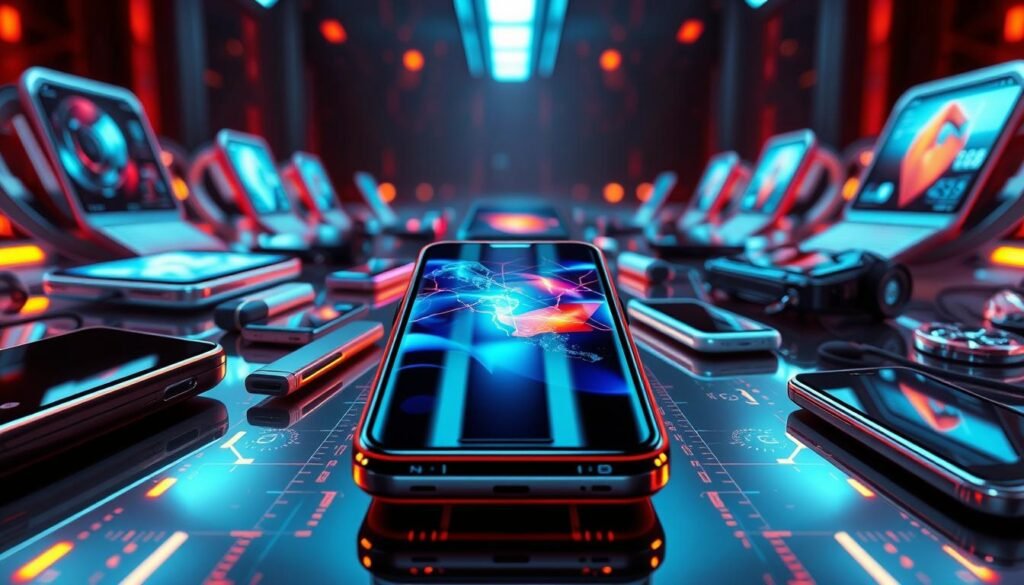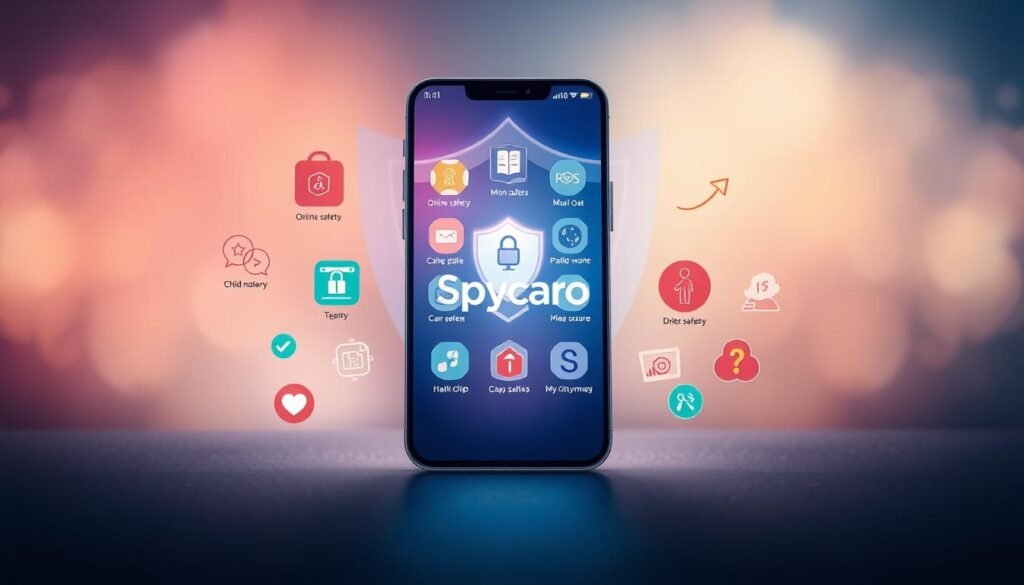Are you ready to unlock your phone’s full potential? Modern phones have changed from simple phones to powerful computers in your pocket. They connect us like never before, changing our daily lives.
The Samsung Galaxy S24 Series shows how far mobile tech has come. It has AI features like Live Translate and Note Assist. These phones can translate, take notes, and help you stay productive all at once.
The Galaxy S24 Ultra also has amazing AI photo editing tools. It can turn simple photos into professional ones. It can even change backgrounds and suggest edits, making your phone a mini photo studio.
Another big feature is Circle to Search with Google on the Galaxy S24. It lets you search by circling text or images. This makes finding information fast and easy, without typing.
As we look into modern phones and mobile computing, we see how they’re changing our lives. They’re not just keeping up; they’re leading the way to a smarter future. Are you ready to see what your phone can do?
Introduction to Modern Phones
Handheld devices have come a long way from being bulky bricks to sleek smartphones. In 1983, the Motorola DynaTAC 8000X weighed nearly 2 pounds and had a 30-minute battery life. It cost a staggering $3,995. Now, we carry powerful computers in our pockets.
Overview of the Smartphone Evolution
The term “smartphone” was first used in 1997 by Ericsson for its GS88 model. But the real change came in 2007 with the iPhone. It introduced capacitive touchscreen interfaces, making devices easier to use. This change revolutionized how we interact with our devices.
Key Features that Define Modern Phones
Today’s smartphones are incredible feats of technology. They have advanced cameras, seamless wireless connectivity, and fast network speeds. They combine many functions into one device, making them all-in-one gadgets.
| Feature | Impact |
|---|---|
| Touchscreen Interfaces | Intuitive user experience |
| Wireless Connectivity | Constant internet access |
| Advanced Cameras | Professional-quality photos |
| Mobile Apps | Expanded functionality |
Smartphones have changed how we communicate, shop, and have fun. With 5G networks, they will become even more important in our lives.
The Rise of 5G Technology
5G technology is changing how we connect and compute on the go. It offers faster speeds, lower delays, and more capacity. As it spreads worldwide, it’s changing how we use our devices and interact online.
Benefits of 5G in daily life
5G makes our daily lives better in many ways. It lets us download videos quickly, making streaming smooth. It also makes remote work better with clearer video calls. Healthcare gets a boost with better telemedicine and patient monitoring.
How 5G enhances mobile experiences
5G has a big impact on mobile computing. It lets us enjoy augmented and virtual reality on our phones. Gaming gets more realistic with less lag. It also helps grow the Internet of Things, making homes and cities smarter.
The future of connectivity
5G will change many industries, not just personal use. It helps in manufacturing by monitoring and predicting maintenance needs. It also improves car-to-car communication in the automotive sector. As 5G grows, it will lead to new innovations in technology and connectivity.
| 5G Feature | Impact |
|---|---|
| Faster Speeds | Improved streaming, faster downloads |
| Lower Latency | Enhanced gaming, real-time applications |
| Increased Capacity | Support for more IoT devices |
| Improved Reliability | Consistent connections in crowded areas |
Essential Features of Modern Smartphones
Modern smartphones are like tiny computers. They have amazing cameras, long battery life, and cool touchscreen interfaces. These features make them very powerful.
Camera Advancements and Photography
Today’s smartphones have incredible cameras. Some have up to 50MP main cameras. They can take great photos, even in low light.
Battery Life Improvements and Innovations
Battery life has gotten much better. Phones now have special batteries that last longer. This means you can use your phone all day without needing to charge it.
Display Technology Evolution
Touchscreens have changed a lot. Many phones have AMOLED displays for bright colors and clear pictures. You can also switch between dark and light modes to make your screen easier on your eyes.
| Feature | Percentage of Smartphones | Description |
|---|---|---|
| Dark/Light Mode | 66% | Option to switch display modes |
| AI Wallpaper | 40% | Generate unique backgrounds |
| Wireless Printing | 45% | Print documents and photos wirelessly |
| Screen Recording | 30% | Record on-screen activity |
Smartphones keep getting better. They help us stay in touch, work efficiently, and be creative every day.
Operating Systems: iOS vs. Android
The world of Mobile Computing is led by two big names: iOS and Android. These systems shape how millions of smartphone users experience their devices.
Comparing User Experiences
iOS is found only on Apple devices and offers a smooth, connected experience. Android, on the other hand, is on many devices and gives users more freedom. iOS has a strong iMessage app with cool features like Animoji and in-app payments. Android, meanwhile, has RCS messaging with end-to-end encryption for private chats.
Customization Options
Android wins when it comes to customization. Users can get apps from many places and even install apps directly. iOS, however, only lets users get apps from the Apple App Store. This means iOS has more control but less choice for users. Android also offers a wide range of devices, from cheap to very expensive.
Updates and Security
Apple’s iOS usually supports devices for a long time with updates. Android, however, has trouble keeping all devices up to date because of different manufacturers. Both systems focus on keeping users safe, but in different ways. iOS’s closed system is very secure, while Android’s openness means users need to be careful.
| Feature | iOS | Android |
|---|---|---|
| App Store Size | Over 1 million apps | Over 1 million apps |
| Customization | Limited | Extensive |
| Update Support | Long-term | Varies by manufacturer |
| Price Range | $429+ | $100 – $2,000+ |
Choosing between iOS and Android depends on what you value most in your mobile experience. Both systems are constantly improving, making mobile computing better for everyone.
Smart Technology Integration
Smart phones are now key to managing our digital lives. They connect with smart home devices, making our daily routines better. This mix of mobile computing and wireless connectivity has changed how we live.
Modern Phones and Smart Home Devices
Today, smartphones control many smart home gadgets. They adjust thermostats and control lights, making our homes more efficient and comfy. The smart home market is growing fast, expected to hit $53.45 billion by 2022.
46% of smart home owners use voice commands to control their devices. This shows how smart technology is becoming a big part of our lives.
Mobile Apps: The Key to Seamless Living
Mobile apps are essential for smart technology. They connect us to our smart devices, making it easy to manage and automate tasks. In 2018, over 105 billion mobile apps were downloaded.
These apps control everything from security cameras to energy management tools. They’re all accessible from your smartphone.
Smart technology isn’t just for homes anymore. It’s also in cars. By 2023, 60% of new cars will have smartphone mirroring technology. This shows how mobile computing is important in our daily lives, from home to car.
Eco-Friendly Innovations in Phones
The smartphone world is moving towards being more green. Today’s phones are becoming more eco-friendly. This is thanks to the use of sustainable materials and designs that save energy.
Sustainable Materials and Design Choices
Phone companies are now using recycled materials. For instance, the Samsung Galaxy S22 series has 20% recycled ocean-bound plastic. The Fairphone 5 leads in sustainability, using 42% of its parts in an ethical way.
Energy-Efficient Technology
Modern phones are getting better at saving energy. The iPhone 14 Pro uses 54% less energy than older systems. This not only makes batteries last longer but also cuts down on carbon emissions.
| Phone Model | Eco-Friendly Feature | Impact |
|---|---|---|
| iPhone 14 Pro | Energy Efficiency | 65kg carbon footprint (6% less than previous model) |
| Samsung Galaxy S22 | Recycled Materials | 20% recycled ocean-bound plastic |
| Fairphone 5 | Sustainable Sourcing | 42% of materials sourced sustainably |
These green steps in phone tech are key to lessening the industry’s harm to the planet. By picking phones with eco-friendly features, we help make the future greener. We also get to enjoy the latest tech.
Choosing the Right Modern Phone
Finding the perfect smartphone can be tough with so many choices. Modern phones have features for everyone, no matter your budget. Let’s look at what to consider when picking your next phone.
Factors for Different Users
Think about what matters most to you. Do you want a great camera or a phone that lasts all day? Here are some key things to consider:
- Screen size and quality
- Camera capabilities
- Processor performance
- Battery capacity
- Storage space
- Build quality and durability
The iPhone 16 has a big 6.1-inch OLED screen and a 48-megapixel camera. It’s perfect for those who love taking photos. The Google Pixel 9, on the other hand, has a fast Tensor G4 processor. It’s great for those who want a smooth experience.
Price Ranges and Budget Options
Smartphones come in all price ranges. Here’s a quick look at some options:
| Phone Model | Regular Price | Best Deal Price | Savings |
|---|---|---|---|
| iPhone 16 | $799 | $799 | $0 |
| Google Pixel 9 | $799 | $649 | $150 |
| Samsung Galaxy S24 Ultra | $1,299.99 | $941.43 | $358.56 |
| TCL Flip 2 | $27.99 | $27.99 | $0 |
Choosing the right phone is about finding the right mix of features, price, and what you need. Whether you want the latest tech or something affordable, there’s a phone for you.
The Role of AI in Modern Phones
Artificial Intelligence (AI) has changed the game in Smartphone Technology. It has made phones smarter and more efficient. Today, smartphones are intelligent, thanks to AI.
AI Assistants and Daily Tasks
AI-powered virtual assistants have changed how we use our phones. They can schedule appointments and set reminders. They even predict what we need based on our routines.
The latest smartphones use AI to make our lives easier. They automate tasks, making our days more efficient.
Personalized User Experiences
AI makes smartphones fit each user’s needs. It learns our habits and adjusts settings for us. It also gives us personalized recommendations.
This customization is seen in many areas of Mobile Computing. It includes app suggestions and battery optimization.
| AI Feature | Benefit |
|---|---|
| Predictive Text | Faster typing, fewer errors |
| Smart Camera | Enhanced photo quality, scene recognition |
| Voice Recognition | Improved virtual assistant accuracy |
| Battery Management | Extended battery life |
AI in smartphones is growing fast. Experts predict a huge increase in AI-enabled phone sales in 2024. This shows how important AI is for the future of Mobile Computing and better User Experience.
Privacy and Security in Smartphones
Smartphones have become a big part of our lives. They started with iPhones and Android in 2007. But, they also raised privacy concerns. Today, smartphones collect and share data without always asking us first.
Protecting Personal Information
Phone makers are adding new security features to keep our data safe:
- Biometric authentication: Facial recognition, fingerprint scanning, and iris scanning make phones more secure than old methods.
- Encryption: It locks data, so only the right key can unlock it.
- Secure Boot and Hardware Security Modules: They protect against serious attacks.
- Regular security updates: They fix problems and make phones safer.
Tips for Safer Phone Usage
Here are some ways to make your phone more secure:
- Use strong passwords and enable two-factor authentication.
- Be careful with app permissions to control data sharing.
- Use VPNs and secure Wi-Fi for safer internet.
- Keep your device updated with the latest security patches.
- Think about using privacy-focused phones like Purism’s Librem 5, which has special hardware switches.
By following these tips, you can greatly improve your phone’s privacy and security. This is important in today’s world of smartphones.
The Impact of Smartphones on Society
Smartphones have changed our world a lot. They’ve changed how we talk, work, and live. These devices are now a big part of our daily lives, giving us great connectivity and convenience.
Changing Communication Patterns
Mobile computing has changed how we talk to each other. Text messaging is now the top way to communicate, especially for the young. A study showed that young adults send more texts than older people.
This change has made our writing different. We use more abbreviations and emojis now.
Influence on Work and Productivity
Smartphones have changed the workplace. They let people work from anywhere, making work more efficient. But, they also make it hard to separate work from personal life.
| Positive Impacts | Negative Impacts |
|---|---|
| Enhanced communication | Decreased face-to-face interactions |
| Improved productivity | Digital addiction risks |
| Access to information | Privacy concerns |
| Simplified daily tasks | Potential mental health issues |
Smartphones have many good points but also some bad ones. They make our lives easier but we need to find a balance. Understanding how smartphones affect us is key to using them wisely.
Future Trends in Smartphone Technology
Smartphone technology is changing fast, leading to new things in Mobile Computing. We’re seeing big changes in our digital friends.
Upcoming Features to Watch For
Phone makers are introducing cool new features. Foldable screens let us have big screens without being big. Augmented reality (AR) will change how we see the world through our phones.
Wireless tech is getting better too. Soon, we’ll have satellite networks everywhere.
Predictions for the Next Decade
The next ten years will bring big changes. Solid-state batteries could change how we charge and use our phones. AI will get smarter, making our phones more personal and private.
| Feature | Current Status | Future Prediction |
|---|---|---|
| Battery Technology | Lithium-ion | Solid-state batteries by 2025 |
| Display | Foldable screens | Graphene-based flexible displays |
| Connectivity | 5G | Satellite-based global coverage |
| Security | Fingerprint, Face ID | Advanced biometrics, on-device AI |
As Mobile Computing grows, phones will play an even bigger role in our lives. We’ll see better batteries, more security, and easier connections with other devices. The future of phones looks very promising.
Conclusion: Embracing Smart Technology
Modern phones have changed our lives in big ways. They offer many benefits beyond just talking to each other. The tech in our phones today shows how far we’ve come.
Summary of the benefits of modern phones
Smartphones are now a big part of our daily lives. People use them for 3-4 hours every day. This shows how much they can do for us.
They help us work better and have fun. They’ve changed how we see and interact with the world.
Smartphones also play a big role in healthcare. They let us have doctor visits online, check pacemakers, and even help find illnesses. For those in remote places, this is a game-changer. It brings medical help that was hard to get before.
Encouragement to adapt to new technologies
Looking ahead, smartphones will keep getting better. They’ll use AI and be kinder to the planet. This means even more good things for us.
By using these new features, we can make our lives better. We’ll work smarter and stay in touch with others in our digital world.


